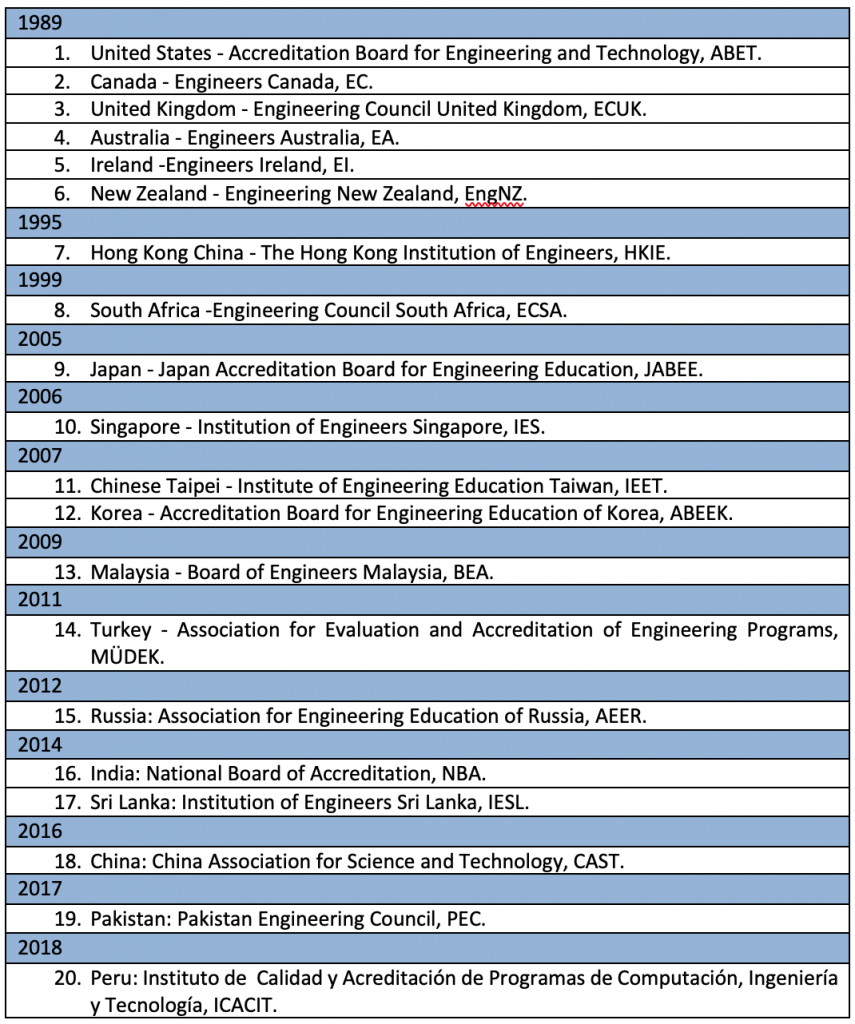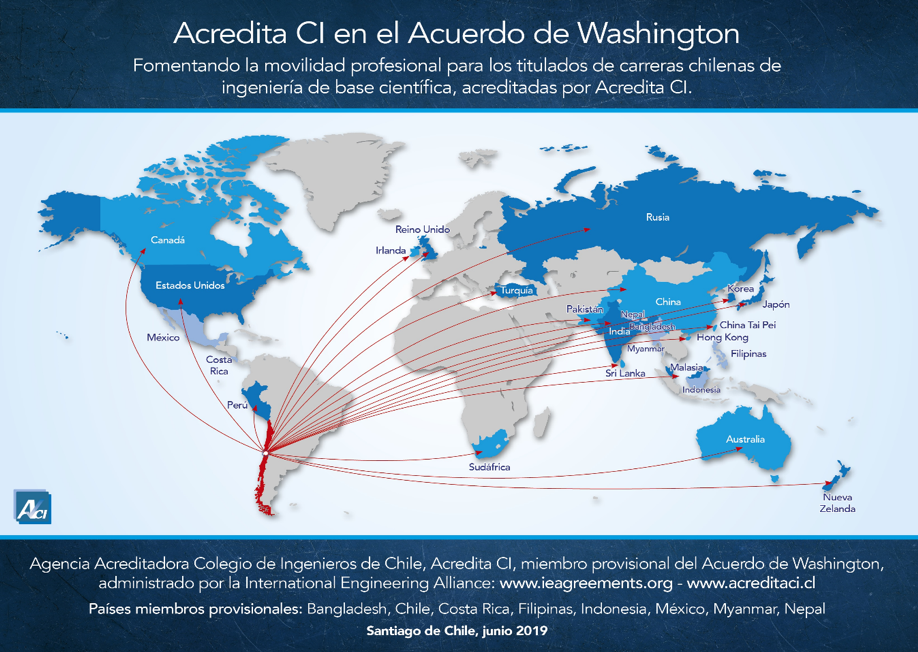The Washington Accord is the most prestigious international accord among the entities that grant the accreditation of engineering programs in each country or jurisdiction that is a member of the Agreement, which establishes that when accreditation is granted by a full member of the Agreement (or signatory member) in its jurisdiction, the program will be considered substantially equivalent by most of the other member countries and this will substantially facilitate the professional mobility.
The following are signatory members of the Washington Accord, according to their date of incorporation into the Accord:

The following countries are provisional members of the Accord (November 2019), which are recognized for having comparable accreditation systems and processes and that would potentially allow them to become signatory members:
- Chile: Agencia Acreditadora del Colegio de Ingenieros de Chile, Acredita CI.
Provisional status approved in 2018.
- Thailand: Council of Engineers Thailand, COET.
Provisional status approved in 2019.
- Bangladesh: Institution of Engineers Bangladesh, IEB.
Provisional status approved in 2016.
- Costa Rica: Colegio Federado de Ingenieros y Arquitectos de Costa Rica, CFIA.
Provisional status approved in 2016.
- Mexico: Consejo de Acreditación de la Enseñanza de la Ingeniería, CACEI.
Provisional status approved in 2016.
- Philippines: Philippine Technological Council, PTC.
Provisional status approved in 2016.
- Myanmar: Myanmar Engineering Council, MEngC.
Provisional status approved in 2019.
- Indonesia: Indonesian Accreditation Board for Engineering Education, IABEE.
Provisional status approved in 2019.
Among the requirements to be incorporated as a signatory member, the Accrediting Agency must demonstrate:
- That it is a non-governmental entity.
- That it is a non-profit entity.
- That it is an autonomous and independent entity of the Higher Education Institutions.
- That it has a rigorous system of control of conflicts of interest among its members: councilors, evaluator peers, staff and managers.
- That it is recognized by the engineering community as an authority in the accreditation of engineering. Acredita CI is part of the Colegio de Ingenieros de Chile, a non-profit entity, whose main purpose is to ensure the progress, prestige and prerogatives of the profession, for its correct exercise and for the due protection of engineers. These purposes define the Agency’s work in the educational field.
- It is recognized in the field of professional performance. Accreditation is recognized as an indicator that the program meets the academic requirements for the practice of engineering in the country.
- That it has stakeholder autonomy to make accreditation decisions.
- It has a set of policies to incorporate improvements in the accreditation criteria and standards that it applies.
Full membership will allow the accreditation granted by Acredita CI to be recognized as comparable among all member countries, and has the following advantages for the accredited program and for Chile:
- It facilitates the mobility of its graduates for professional performance in member countries.
- The accredited program is recognized as Substantially Equivalent.
- Substantially increases the prestige of the Institution in which the program is taught, by making itself known to the international community with accredited programs.
- It ensures a solid quality assurance process.
And, in the context of mandatory institutional accreditation, it is a mechanism that supports the institution in strengthening and consolidating mechanisms for continuous improvement in programs.
Acredita CI will explicitly report on its website, in the Menu option: Accredited Programs, those engineering programs accredited with current accreditation. And it will explicitly indicate when this accreditation allows the program to be recognized as substantially equivalent. In accordance with IEA procedures, this should be from June 2022 with the accreditation of the programs that have been carried out from June 2021.
Engineering degrees in Chile are invited to join the accreditation process under international criteria. Get Accredited.
Finally, there is a resounding change of focus in the development of the processes, for which the Institutions must incorporate adjustments to their continuous improvement processes, to generate irrefutable evidence to present themselves to this process, which requires demonstrating the committed results in the educational process through an evidence system. Acredita CI will provide training activities to incorporate best practices in this process.
The evaluation criteria include showing that in the educational process, the science-based engineering program achieves the following attributes in the graduate:
- Engineering Knowledge.
- Problem Analysis.
- Design / Development of Solutions.
- Investigation
- Modern tool Usage.
- The Engineer and Society.
- Environment and Sustainability.
- Ethics.
- Individual and Team Work.
- Communication.
- Project Management and Finance.
- Lifelong Learning.
See the detail of the Graduate Attributes in the Acredita CI Master Manual for Science-Based Engineering Programs.
